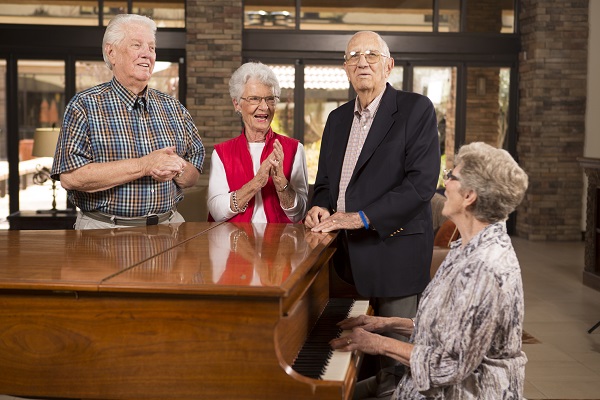7 Reasons Older Adults Should Add More Music to their Lives

Every human culture has a musical tradition. Why do we love music? If you think about it, isn’t it remarkable that among all the many noises in the world, we perceive certain tones, patterns and intervals as “music”?
Brain scientists continue to study this uniquely human mystery, and now they are even using advanced imaging to map the parts of the brain that operate when we’re listening to our favorite tunes or singing a song. And scientists are finding more and more health benefits we gain from music, beginning at birth and lasting through the end of our lives.
Here are just a few documented benefits of music:
- Music connects us with others. Even before the pandemic, experts reported that our culture has been experiencing an “epidemic of loneliness”—and as we grow older, it becomes all the more difficult to stay socially connected. Music is a great tool for creating bonds among people, cutting across backgrounds, abilities and generations. Imaging shows that when a group of people perform or listen to music together, their brains show coordinated neurological responses to the rhythms and mood, resulting in a feeling of connection and togetherness.
- It can keep our fitness program on track. As we grow older it can require more will power to stick with our exercise regimen. From dancing, to wearing headphones while we run, to attending a musical fitness class, music both distracts and entertains us as our workout effort passes. And did you know that fast-paced music can help us reach our target heart rate? University of British Columbia researcher Matthew Stork noted, “Humans have an innate tendency to alter the frequency of their biological rhythms toward that of musical rhythms. It’s incredible how powerful music can be.”
- Music also is great exercise for the brain. Neurologists tell us that following and interpreting a melody, anticipating patterns, and making sense of a piece of music gives the brain a good workout. And it’s never too late to join a musical group, or learn to play an instrument. Said Emory University researcher Brenda Hanna-Pladdy, “Musical activity throughout life may serve as a challenging cognitive exercise, making your brain fitter and more capable of accommodating the challenges of aging.”
- Music can be a great stimulus for life review. One of the most important “tasks” of older adults is to look back on their lives, reminiscing, recollecting and putting everything into perspective. This provides a sense of purpose and meaning. Stored in the brain along with particularly vivid memories, music helps us visualize a particular time and our place in it.
- Music can be a powerful tool for people with memory loss. What about life review when a person has Alzheimer’s disease or other dementia? Music is stored differently in the brain than is speech, so it can bring forth recollections that mere words cannot. The cognitive and emotional effects of music help people with dementia connect not only with their own memories, but also with other people and the world around them. Music also reduces agitation and anxiety, and improves sleep.
- It can promote stroke recovery. The American Heart Association reported that stroke survivors experience enhanced improvements in balance and strength when they listen to music during rehabilitation sessions. Just as is the case with memory loss, music may help patients access different part of the brain that are involved in movement and coordination. Music also lessens depression among stroke survivors.
- Music provides peace and comfort for people at the end of life. Many hospice organizations today use music therapy to meet the emotional, spiritual and social needs of patients. Studies show music increases feelings of well-being and transcendence and emotionally connects the patient with family and others present. It also can reduce sensations of pain.
These aren’t by any means the only benefits we stand to gain by adding more music to our lives. So find opportunities to both experience and create music. Listen to music online and create a playlist. If it’s safe, go to concerts. If you live in a senior living community, check out musical offerings in the activities program. Or take part in multicultural events—you might find a whole new genre of music to inspire you!
Source: IlluminAge

